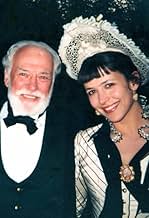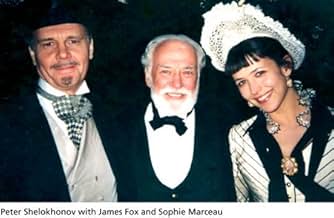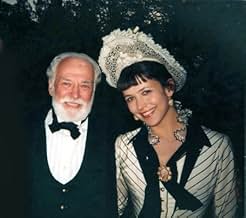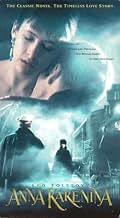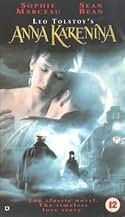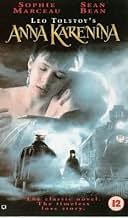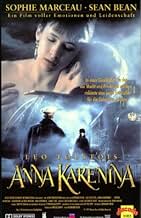CALIFICACIÓN DE IMDb
6.3/10
6.4 k
TU CALIFICACIÓN
Anna (Marceau) es una esposa y madre que tiene una aventura con el apuesto conde Vronsky. Basado en la novela de Tolstoi.Anna (Marceau) es una esposa y madre que tiene una aventura con el apuesto conde Vronsky. Basado en la novela de Tolstoi.Anna (Marceau) es una esposa y madre que tiene una aventura con el apuesto conde Vronsky. Basado en la novela de Tolstoi.
Petr Shelokhonov
- Kapitonich, Chief Butler
- (as Pyotr Sholokhov)
- Dirección
- Guionistas
- Todo el elenco y el equipo
- Producción, taquilla y más en IMDbPro
Opiniones destacadas
Visually, this film is gorgeous. Sophie Marceau is perfect as Anna and Alfred Molina also shines. Sean Bean, known for finding the humanity in the worst of characters, is the most likeable, sympathetic and attractive Vronsky I have seen. He does not portray the transformation of the selfish, spoilt, wealthy and aristocratic mother's darling into a deeply remorseful, more mature individual who learns that there is a price to pay for taking whatever you want and you had better consider the price worth it. A pity as the contrasting story of Levin (Alfred Molina) and his unselfish devotion to Princess Kitty requires that the point be made. You reap what you sow. Similarly, James Fox is too tolerant and long-suffering as Karenin. Tostoy's Karenin is a self-important bureaucrat who disguises his revenge on Anna as piety. HOWEVER...maybe not be accurate Tolstoy but the sheer niceness of all the characters makes one care far more when tragedy strikes than I ever did when I read the book. Gorgeous music also.
Of all the versions of the Tolstoy novel which I have seen (two with Greta Garbo, the deplorable one with Vivien Leigh, another with Jacqueline Bisset), this is the one that really reflects the scope and social observation of the book. The careful direction and art direction, the St.Petersburg backgrounds, as well as the exquisite cinematography, make this movie a real feast for the eyes, with magnificent plastic compositions and lighting in every shot. The abused Tchaikovsky music was used discreetly. Sophie Marceau plays a very young Anna, and makes her credible all the time. Sean Bean and James Fox, as Vronsky and Karenin, are admirable. And even if the screen play by director Bernard Rose is a little too literary, the complete story was told, and the result was the best Anna Karenina the screen has offered.
According to an earlier review, this movie is supposed to be "just plan awful." The writer probably meant "plain" instead of "plan," and that misspelling may be an indication of the quality of the review.
There is much to be said for the viewpoint that this film version of Tolstoy's novel, starring Sophie Marceau, must certainly be one of the greatest versions ever produced.
Tolstoy himself lived to see just the beginning of the era of the motion picture and was said to have been fascinated by the possibilities the new medium presented. If so, he would no doubt have been quite astonished at the beauty and the extraordinary quality of this rendition of his story about Anna Karenina. The production values are among the highest there could possibly be. The costumes, the cinematography, and the sets unlike earlier versions, the film was shot on location in St. Petersburg and elsewhere in Russia are at such a remarkable level that the action almost does appear to be really taking place in the Czarist period at the end of the nineteenth century.
As for Sophie Marceau's mild French accent which the above-mentioned reviewer found so irritating it is quite likely that many upper-classes Russians of the period actually did speak with a French accent. It was not Russian but French that was the dominant language among the Russian nobility and aristocracy of the time for some, French was in fact their native language, since many of them never learned to speak Russian at all, except perhaps a few words and phrases they could use to communicate with the servants.
What is perhaps most remarkable of all in this film is the utterly believable way that the behavior of the of characters is presented. Their motives are suggested with great subtlety, not in the somewhat simplistic tones of the (nevertheless still magnificent) MGM version of the film that starred Greta Garbo seventy years ago. Anna's husband is not a monster, for example, in this new version, but a rather pathetic, right-wing government bureaucrat with obsessively strict moral values. Moreover, the portrayal of Anna's behavior throughout the film, and especially in the final scenes, is a masterpiece of sympathetic psychological insight and understanding.
This film is a for the time being, anyway neglected classic.
There is much to be said for the viewpoint that this film version of Tolstoy's novel, starring Sophie Marceau, must certainly be one of the greatest versions ever produced.
Tolstoy himself lived to see just the beginning of the era of the motion picture and was said to have been fascinated by the possibilities the new medium presented. If so, he would no doubt have been quite astonished at the beauty and the extraordinary quality of this rendition of his story about Anna Karenina. The production values are among the highest there could possibly be. The costumes, the cinematography, and the sets unlike earlier versions, the film was shot on location in St. Petersburg and elsewhere in Russia are at such a remarkable level that the action almost does appear to be really taking place in the Czarist period at the end of the nineteenth century.
As for Sophie Marceau's mild French accent which the above-mentioned reviewer found so irritating it is quite likely that many upper-classes Russians of the period actually did speak with a French accent. It was not Russian but French that was the dominant language among the Russian nobility and aristocracy of the time for some, French was in fact their native language, since many of them never learned to speak Russian at all, except perhaps a few words and phrases they could use to communicate with the servants.
What is perhaps most remarkable of all in this film is the utterly believable way that the behavior of the of characters is presented. Their motives are suggested with great subtlety, not in the somewhat simplistic tones of the (nevertheless still magnificent) MGM version of the film that starred Greta Garbo seventy years ago. Anna's husband is not a monster, for example, in this new version, but a rather pathetic, right-wing government bureaucrat with obsessively strict moral values. Moreover, the portrayal of Anna's behavior throughout the film, and especially in the final scenes, is a masterpiece of sympathetic psychological insight and understanding.
This film is a for the time being, anyway neglected classic.
I saw this movie almost accidentally and I LOVED it! It made me a fan of Sophie Marceau, a beautiful and talented French actress. To my delight Sophie is starring in some upcoming movies (which I will not miss). I would recommend this movie to anyone looking for a movie with all the components that makes a classic. Too bad it didn't hit the mainstream, it was very under-rated. Bottom line: I loved this movie, and I am usually quite picky about which movies I say that about!
Now, perhaps I'm out of my element writing a review for "Anna Karenina" without having read the book, but I shall do so regardless. Many criticised this film because it did not follow the book, or omitted one thing or another. That is all well and good, but what feature-length film *can* capture the entire scope of a novel the size of "Anna Karenina"? I watched the older version with Greta Garbo and--though I cannot imagine why--it never truly caught my attention. This version, however, captured me from the start. And I am usually the first one to complain about what is wrong with a remake in comparison to the old version. A paradox, indeed.
This film first caught my eye because of Sophie Marceau. I admire her immensely as an actress, having seen her in several films, both French and English. Then, I recognised Bernard Rose as the director of "Immortal Beloved", a film I had enjoyed some months before, mostly due to a magnificent performance by Gary Oldman, some of the most glorious music caught on film.
The music, I can probably cite as one of the main reasons I loved this film. I can think of no better love theme for a doomed romance like that of Anna and Vronsky, than the first movement of Tchaikovsky's Sixth Symphony. The use of "Swan Lake" at various points was also wonderful, and the interplay during the scene at the ballet held me mesmerised. Vronsky speaks of Anna being trapped in her marriage as the Prince seeks to capture the Swan Queen. Perhaps I'm just rambling, but somehow that connected.
On the whole, the performances were good. Sophie Marceau was perfectly believable as Anna, and some of her scenes sent chills down my spine, though my favourite performance of hers still has to be "Firelight". Sean Bean had me worried for a few seconds, with a mannered reading or two, but improved quickly as the film progressed. Another reviewer pointed out that Vronsky was meant to be a shallower character than Anna, and now that I think back on it, I believe that is very true, and that Sean Bean's performance reflected this superficiality. Mia Kirshner was adequate--I didn't particularly care for her--but Alfred Molina and James Fox both gave fine performances (a standout for me was when Anna wrote Karenin from Italy and Karenin wavered before refusing to let her see Sergei).
However, equally on par with the actors, was the setting. Very few films, I have to admit, can look *so* beautiful. Especially the ballroom scene, with the seemingly neverending hallway of gilded doors, the location photography was spectacular. The costumes were stunning, and the cinematography made even snow seem alive. Even if you do not care for the story or the acting, this is a film to watch for visuals.
Thus, I believe that this film deserves far more credit than it received. I, personally, loved it for varied reasons, but I have to admit that what truly captured me was the way Bernard Rose can take an average script and transform it into a beautiful film using visuals and music. Very few directors take the time to put music and image together if they use classical scores (my favourites would be David Lean and John Boorman), and I believe Bernard Rose should be watched in the future. I should love to see what he would do with a film set in late 19th century Italy, when opera was at its height!
***1/2 out of ****
This film first caught my eye because of Sophie Marceau. I admire her immensely as an actress, having seen her in several films, both French and English. Then, I recognised Bernard Rose as the director of "Immortal Beloved", a film I had enjoyed some months before, mostly due to a magnificent performance by Gary Oldman, some of the most glorious music caught on film.
The music, I can probably cite as one of the main reasons I loved this film. I can think of no better love theme for a doomed romance like that of Anna and Vronsky, than the first movement of Tchaikovsky's Sixth Symphony. The use of "Swan Lake" at various points was also wonderful, and the interplay during the scene at the ballet held me mesmerised. Vronsky speaks of Anna being trapped in her marriage as the Prince seeks to capture the Swan Queen. Perhaps I'm just rambling, but somehow that connected.
On the whole, the performances were good. Sophie Marceau was perfectly believable as Anna, and some of her scenes sent chills down my spine, though my favourite performance of hers still has to be "Firelight". Sean Bean had me worried for a few seconds, with a mannered reading or two, but improved quickly as the film progressed. Another reviewer pointed out that Vronsky was meant to be a shallower character than Anna, and now that I think back on it, I believe that is very true, and that Sean Bean's performance reflected this superficiality. Mia Kirshner was adequate--I didn't particularly care for her--but Alfred Molina and James Fox both gave fine performances (a standout for me was when Anna wrote Karenin from Italy and Karenin wavered before refusing to let her see Sergei).
However, equally on par with the actors, was the setting. Very few films, I have to admit, can look *so* beautiful. Especially the ballroom scene, with the seemingly neverending hallway of gilded doors, the location photography was spectacular. The costumes were stunning, and the cinematography made even snow seem alive. Even if you do not care for the story or the acting, this is a film to watch for visuals.
Thus, I believe that this film deserves far more credit than it received. I, personally, loved it for varied reasons, but I have to admit that what truly captured me was the way Bernard Rose can take an average script and transform it into a beautiful film using visuals and music. Very few directors take the time to put music and image together if they use classical scores (my favourites would be David Lean and John Boorman), and I believe Bernard Rose should be watched in the future. I should love to see what he would do with a film set in late 19th century Italy, when opera was at its height!
***1/2 out of ****
¿Sabías que…?
- TriviaThis was the first western production of "Anna Karenina" to be filmed in Russia (St. Petersburg).
- ErroresDuring the movie, title cards inform the viewer that the story arch unfolds in the years 1880 to 1882 - yet at the end of the movie Vronsky leaves to fight in the Russo-Turkish war of 1877- 1878.
- Citas
Anna Karenina: What are you doing here?
Vronsky: You know that I have come to be where you are. I cannot help myself.
- ConexionesReferenced in 13 posterunek: Kalambury filmowe (1998)
- Bandas sonorasSymphony No. 6 in B Minor, op. 74 (Pathetique)
Written by Pyotr Ilyich Tchaikovsky (as Peter Ilyich Tchaikovsky)
Performed by The St. Petersburg Philharmonic Orchestra
Conducted by Georg Solti (as Sir Georg Solti)
Courtesy of Icon Records and London Records
Selecciones populares
Inicia sesión para calificar y agrega a la lista de videos para obtener recomendaciones personalizadas
- How long is Anna Karenina?Con tecnología de Alexa
Detalles
- Fecha de lanzamiento
- Países de origen
- Sitios oficiales
- Idiomas
- También se conoce como
- Leo Tolstoy's Anna Karenina
- Locaciones de filmación
- Productoras
- Ver más créditos de la compañía en IMDbPro
Taquilla
- Presupuesto
- USD 35,000,000 (estimado)
- Total en EE. UU. y Canadá
- USD 858,553
- Fin de semana de estreno en EE. UU. y Canadá
- USD 75,268
- 6 abr 1997
- Total a nivel mundial
- USD 858,553
- Tiempo de ejecución
- 1h 48min(108 min)
- Color
- Mezcla de sonido
- Relación de aspecto
- 2.35 : 1
Contribuir a esta página
Sugiere una edición o agrega el contenido que falta


